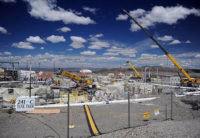Feds Say OK to Northstar's Takeover of Vermont Yankee Nuke Plant

Feds also said firm can tap cleanup trust fund to manage highly radioactive spent fuel storage.
PHOTO COURTESY ENTERGY
A nontraditional and much-watched utility sale of a defunct U.S. nuclear plant to a private remediation firm to speed up site cleanup got a boost on Oct. 12 when the U.S. Nuclear Regulatory Commission approved transfer of the Vermont Yankee plant's operating license to New York City-based contractor NorthStar Group Services.
The license for the Vernon, Vt., facility has been held by Entergy, a New Orleans utility and merchant power producer.
Vermont regulators now must make the final decision on the new ownership and the start of an estimated $500-million decontamination and decommissioning (D&D) of the 620-MW single-unit plant that shut down in 2014 after 42 years.
But the NRC approval is a key step. NorthStar will dismantle the plant under the agency’s Prompt DECON option rather than letting it “cool down” for 50 years. Entergy planned to begin D&D work in 2068, but NorthStar will begin by 2021 or as early as next year and complete it no later than 2030.
After a 20-month review, NRC confirmed that NorthStar met the regulatory, legal, technical and financial requirements to hold the license. The agency also approved NorthStar’s request to use up to $20 million at any one time from Vermont Yankee’s currently estimated $528-million D&D trust fund to manage highly radioactive spent fuel.
Entergy announced the transfer deal to NorthStar in 2016. The demolition and remediation firm, which ranks at No. 42 on ENR’s Top 600 Specialty Contractors list with $484 million in 2017 revenue, has said it can complete cleanup within the trust fund amount.
The state utility commission now is reviewing the ownership transfer, which still has opponents.
The Conservation Law Foundation, which did not sign a multi-stakeholder cleanup pact in March, said NRC approved the transfer only with additional conditions, including more bonding, financial assurances, confirmed insurance coverage and others. These partially address what the advocacy group’s senior attorney, Sandra Levine, says are serious deficits in NorthStar’s proposal.
NorthStar CEO Scott State says he hopes NRC’s ruling will enable a faster state review so the transfer can complete this year, but closing could extend to June 2019, Entergy has said.
In August, Holtec International removed all of Vermont Yankee’s spent fuel to dry storage. Entergy now is shutting down plant systems no longer needed. NorthStar has done limited on-site D&D work, says T. Michael Twomey, an Entergy vice president.
NorthStar and joint venture partner Orano USA, a French-owned firm formerly called Areva that is a Vermont Yankee subcontractor, are in talks with other utilities on D&D projects, says State. He estimates a growing market of at least $1 billion to $2 billion per year.
Orano and its partner Waste Control Partners have filed an NRC application to build and operate a spent-fuel interim storage facility in Texas. Holtec and partner SNC-Lavalin Group signed three site cleanup sales deals last year—with Entergy for two plant takeovers and with Exelon Generation for one.
Separately, U.S. appeals courts in Chicago and New York City last month offered a possible lifeline to nuclear plants in Illinois and New York that now operate under tough market conditions.
Their rulings upheld state actions to subsidize merchant nuclear plants that cannot compete against fossil fuel plants’ low natural gas prices or against renewable energy sources that receive subsidies and incentives. State laws reward the nuclear plants for having no CO2 emissions.
The Chicago court said an Illinois mandate that carbon-emitting power plants buy zero-emission credits from nuclear units, calculated at $16.50/MWh, does not violate federal law. The decision upheld a lower court ruling that Illinois can regulate energy generation within its borders.
New York requires utilities to buy credits at $17.48/MWh; the credits are going to three Exelon plants at risk of closing.
Opponents of such credit setups argue that subsidies alter power-auction results and distort mechanisms to determine plant closings.
New Jersey now is set to weigh the issues as subsidy opponents and supporters square off in a new proceeding to possibly lift $300 million in annual subsidies to three operating nuclear plants.


